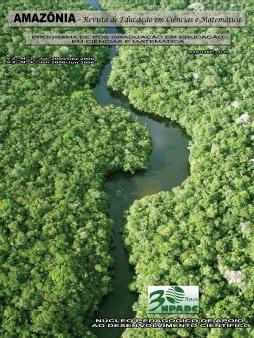Thinking and teaching at the UFPA Science Club: reflections on the practice
DOI:
https://doi.org/10.18542/amazrecm.v2i0.1674Keywords:
teacher formation, science teaching, non-formal teaching spaceAbstract
This article discusses and reflects on the teaching practical of a group of teachers on formation of CCIUFPA. In the telling of developed activities, we investigate that elements /relations/discussions had involved thinking and making of this group, looking for to understand of that way the activities had been realized and discussing elements that had appeared in the elapse on the work. We appeal to the planning of the activities, to the works developed for the pupils and to interviews with the teachers. We search relations between the ideas of the teachers on the activities and its execution, establishing as main point of comparison conceptions about the scientific activity, which could determine the form as the knowledge of the pupils would be treated by the teachers and as the activities could modify distorted conceptions. We concluded that thinking and making they must be associates in the teaching actionReferences
BIANCONI, M. L. e CARUSO, F. Educação não formal. Ciência e Cultura. São Paulo, v. 57, n.4, 2005, p. 20.
BIEMBENGUT, M. S. e HEIN, N. Modelagem Matemática no Ensino. São Paulo: Contexto, 2003.
CALOR, A. R. e SANTOS, C. M. D. Filosofia e ensino de ciências: uma convergência necessária. Ciência Hoje. São Paulo, v. 35, n. 210, 2005.
CUNHA, M. I. Conta-me agora! As narrativas como alternativas pedagógicas na pesquisa e no ensino. Revista da Faculdade de Educação da USP. São Paulo, v. 23, n. 1-2, 1997.
DEMO, P. Pesquisa: princípio científico e educativo. 10. ed. São Paulo: Cortez, 2003.
GIL PÉREZ, D.; MONTORO, I. F.; ALÍS, J. C.; CACHAPUZ, A.; PRAIA, J. Para uma imagem não deformada do trabalho científico. Ciência e Educação. São Paulo, v. 7, n. 2, 2001, p. 125-153.
GONÇALVES, T. V. O. Ensino de Ciências e Matemática e formação docente: marcas da diferença. Tese de Doutorado. Faculdade de Educação da Universidade Estadual de Campinas., 2000.
HENNIG, G. J. Metodologia do ensino de Ciências. Porto Alegre: Mercado Aberto, 1986.
KOSMINSKY, L. e GIORDAN, M. Visões de Ciências e sobre cientista entre estudantes do Ensino Médio. Química Nova na Escola. Belo Horizonte, n. 15, 2002, p. 11-18.
MALDANER, O. A. Professor-pesquisador: uma nova compreensão do trabalho docente. Espaço da Escola. Ijuí, ano 4, n.31, 1999, p. 5-14.
MORAES, R. Educar pela pesquisa: exercício de aprender a aprender. In: MORAES, R. e LIMA, V. M. R. (orgs.). Pesquisa em Sala de aula: tendências para a educação em novos tempos. Porto Alegre: EDIPUCRS, 2002.
SILVEIRA, F.L. A Filosofia da Ciência de Karl Popper e suas implicações no Ensino da Ciência. In: MOREIRA, M.A. e AXT, R. (orgs.). Tópicos em Ensino de Ciências. Porto Alegre: Sagra, 1991.
SILVEIRA, F.L. A Filosofia da Ciência e o ensino de Ciências. Em aberto. Brasília, ano 11, n. 55, 1992, p. 36-41.
VIEIRA, V; BIANCONI, M. L. e DIAS, M. Espaços não-formais de ensino e o currículo de Ciências. Ciência e Cultura. São Paulo, v. 57, n.4, 2005, p. 21- 23.
ZYLBERSZTAJN, A. Revoluções científicas e ciência normal na sala de aula. In: MOREIRA, M.A. e AXT, R. (orgs.). Tópicos em Ensino de Ciências. Porto Alegre: Sagra, 1991.



